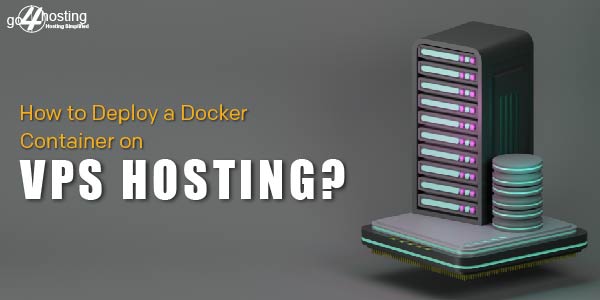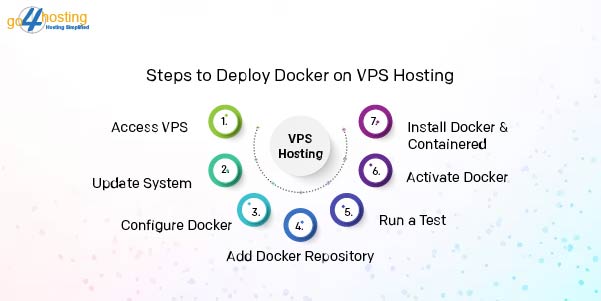How to Deploy a Docker Container on VPS Hosting?

In web hosting, deploying applications efficiently has become a pivotal challenge for businesses seeking optimal performance. As the digital realm expands, the demand for scalable and portable solutions has given rise to containerization technologies. Docker, a leading player in this arena, empowers developers to encapsulate applications and their dependencies into lightweight, portable containers. The containerization market on a global scale is anticipated to experience significant growth in the upcoming years. Thus highlighting the growing acceptance of containerized solutions across various industries.
How do you leverage the capabilities of Docker containers, especially in the context of Virtual Private Server (VPS) hosting in India? Keep reading to discover the solution.
What is Docker and How Does it Work?
Docker is a containerization platform, transforming application development, shipping, and deployment. It empowers developers to package an application and its dependencies into a compact, easily transportable container. These containers are isolated environments that guarantee consistent performance across different computing environments.
Docker employs a client-server architecture where the client communicates with the Docker daemon. The daemon, in turn, manages container creation, running, and other essential tasks. Containers share the host OS kernel but run in isolated user spaces, ensuring efficient resource utilization and rapid deployment.
The power of Docker is evident in its capability to package applications with their dependencies, facilitating seamless transfer across diverse systems. It eradicates the longstanding “it works on my machine” issue and simplifies the development-to-deployment process. Docker transforms applications into portable, scalable, and easily maintainable entities. Thus, it marks a significant advancement in the efficiency of software development and deployment practices.
What Are the System Requirements for Installing Docker?
Docker functions seamlessly with Windows, diverse Linux distributions, and macOS. Given the unique environments of these platforms, each has its own system requirements before being deployed in VPS hosting in India. Here’s a breakdown for each OS
Windows
Before you deploy Docker on VPS hosting in India on Windows system, ensure
- A 64-bit CPU with Second Level Address Translation
- 4GB of RAM
- Hardware virtualization enabled in the BIOS settings
- For Docker with Windows Subsystem for Linux 2 (WSL2), Windows 10 64-bit Home, Pro, Enterprise, or Education (version 1903 or higher) is required, with the WSL 2 feature enabled and the Linux kernel update package installed.
- For those using Hyper-V’s backend and Windows containers, Windows 10 64-bit Pro, Enterprise, or Education (Build 17134 or higher) with Hyper-V and Containers feature enabled is necessary.
Linux
Before you deploy Docker on VPS hosting in India on Linux system, ensure
- Docker seamlessly supports diverse CPU architectures on Linux, guaranteeing compatibility with well-known distributions like CentOS, Debian, Fedora, Raspbian, and Ubuntu.
- To achieve peak performance, Linux users are recommended to have a minimum of 2GB of RAM, with a requirement of at least 512MB.
- The system mandates a kernel version of 3.10 or newer.
- Storage space and CPU power requirements are influenced by factors like the number of containers and the characteristics of stored applications.
macOS
Before you deploy Docker on VPS hosting in India on Linux system, ensure
- For Mac computers equipped with an Intel chip, ensure macOS version 10.14 or newer is installed, with a minimum of 4GB RAM.
- Avoid compatibility issues by not having VirtualBox versions older than 4.3.30 installed.
- For Mac machines with Apple CPUs, make sure Rosetta 2 is installed.
How to install Docker in VPS?

Setting up Docker on your VPS hosting in India is easy. Follow these straightforward steps:
Step-1: Access VPS
Access your VPS hosting in India using admin privileges. If you’re logged in as the primary administrator, you can omit the “sudo” prefix in the following commands.
Step 2:Update System
Next, make sure your system is up-to-date by running the command: sudo yum update -y
Step 3: Configure Docker
As Docker isn’t part of the standard software repository, you’ll have to configure it yourself. Begin by installing the yum-utils package: sudo yum install yum-utils -y
Step 4: Add Docker Repository
Then, add the Docker repository:
sudo yum-config-manager –add-repo https://download.docker.com/linux/centos/docker-ce.repo
Step 5:Install Docker and Containered
Now that the repository is set up, let’s proceed to install Docker and Containerd.
sudo yum install docker-ce docker-ce-cli containerd.io
Step 6: Activate Docker
Activate Docker on your VPS:
sudo systemctl start docker
Step 7: Test
To ensure everything is running smoothly, run a quick test:
sudo docker run hello-world
That’s it! Your VPS is now equipped with a fully operational Docker setup, allowing you to effortlessly deploy and oversee containers.
Wrapping Up

Mastering the deployment of Docker containers on VPS hosting in India opens the door to efficient application development and deployment. As businesses strive for optimal performance in the ever-expanding digital landscape, containerization technologies like Docker prove instrumental.The detailed instructions presented here make installing Docker on a VPS straightforward. By adhering to these steps, users can effortlessly establish Docker, ensuring their VPS is ready to deploy and manage containers seamlessly. It enhances the efficiency of the development process and contributes to a more streamlined and scalable hosting environment. Embracing Docker on VPS is a strategic move toward achieving optimal performance and adaptability in the dynamic landscape of web hosting.
FAQs
- Should I install Docker on VPS?
Yes, installing Docker on a VPS hosting in India is recommended for efficient application development and deployment. Docker allows you to encapsulate applications and their dependencies into portable containers, streamlining the deployment process and ensuring consistent performance across diverse environments. It’s a valuable tool for achieving scalability, portability, and ease of maintenance in a VPS hosting environment.
- Is Docker necessary for deployment?
No, Docker is not strictly necessary for deployment, but it offers significant advantages. Docker simplifies deployment by encapsulating applications and their dependencies into portable containers. It ensures consistency across different environments and streamlines the deployment-to-production workflow. While alternative deployment methods exist, Docker’s containerization technology enhances efficiency, scalability, and ease of maintenance in application deployment.
- Can we run the container without installing Docker?
Certainly, running containers requires the installation of Docker as it serves as a containerization platform. Docker is essential for providing the necessary tools and runtime environment to create, deploy, and manage containers on a system.





